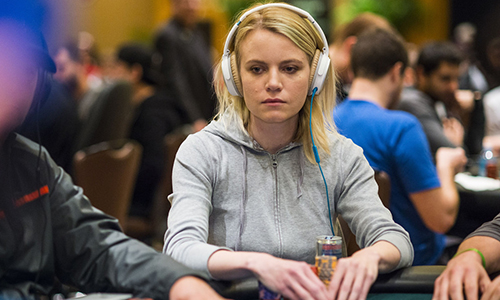Cate Hall Doesn’t Love the GPI Female Player of the Year Award, Which She Won
Aside from possibly World Series of Poker bracelets, poker players generally play the game for money, not awards. But awards are certainly nice and poker players tend to accept them happily. Cate Hall is one of the few exceptions. Last week, Hall raised some eyebrows when she accepted her GPI American Poker Award for GPI Female Poker Player Year as she said the award “doesn’t make a lot of sense” and is a “consolation prize.”

Cate Hall
Photo Credit: TheHendonMob.com
As our readers may well know, the Global Poker Index (GPI) ranks poker players based on their success in live tournaments. Points are awarded for each cash a player makes using a combination of where the player finished, the size of the field, and the buy-in. The GPI Player of the Year rankings take into account a player’s best thirteen results for a calendar year.
In 2016, Cate Hall amassed 2,383.64 points in the Player of the Year race with highlights that included a final table appearance in the World Poker Tour (WPT) Maryland Live! Main Event and a third place finish in a $5,000 event at the WPT Five Diamond World Poker Classic.
That score put her in 78th place in the GPI Player of the Year rankings when 2016 drew to a close. Because she was the highest ranked woman on the list, she was awarded the 2016 GPI Female Player of the Year title. David Peters won the overall GPI Player of the Year award with 3,666.31 points.
In accepting her award at the ceremony in Beverly Hills a week ago, Hall used her moment to express her feelings about how the existence of such a prize is patronizing to women:
I’m really genuinely very proud that I’m winning this award. I have to say, though, that I have some mixed feelings about it because the concept of a Female Player of the Year to me doesn’t make a lot of sense. There were 77 men who finished ahead of me in the overall Player of the Year race this year and for me to get an award ahead of 76 of them it feels to me like it has to send a message that I’m not expected to be able to compete with them.
And in the context of awards for athletic achievement, that makes a lot of sense because men are just faster and stronger; it’s a biological fact. But when carry that over to an award for performance in a mental game, it again feels like it sends a message that men are still in another league and every part of me rebels against that idea….
This is my first year playing poker full-time as a professional. I really feel like if I had been here for five or ten years that I would be able to beat anybody in the world and even if I never get to that point, I will always rather compete for that and lose than to be content with a consolation prize.
But thank you for the consolation prize.
It should be noted that the tone of her speech was pleasant; she laughed at the end when she gave her final thanks for the “consolation prize.” She generally seemed to have a good attitude about the whole thing, understanding that the award was not meant to be offensive – she even posted her speech on Twitter, prefacing it by calling herself a “world-class ingrate.”
Since the speech, Hall has received criticism, mainly of the “if you don’t like it, you shouldn’t have accepted the award” sort. She also was scolded by some moron for speaking up for women in poker while wearing a short dress. Ok….
On Monday, Hall took to Twitter to address the criticisms. Interestingly, she said that she specifically set out to win the Female POY Award just so that she could step up to the microphone and give her two cents about it.
“Couple lingering thoughts on the FPOY thing: (1) I’ve thought the concept was dumb for a long time,” she wrote. “I went after it this year anyway BECAUSE I wanted the platform to criticize it without detracting from someone else’s accomplishment. I told friends about this plan mid-way through the year, and I ground >150 live tourneys in six countries last year to earn that platform. If you think it was the wrong forum to lodge my objections, I’m sorry, but I disagree. It was the most visible and therefore best IMO.”
“(2) I didn’t refuse to accept the award because I was convinced by friends that that would have been an unnecessary slap in the face to GPI/APA, as though I were saying the award were so reprehensible I couldn’t in good conscience accept it,” she continued.
“I think the award is a bad idea. But making a show of refusing it felt disproportionate & also *more* likely to look like attention-seeking. Maybe I should have refused it, I don’t know. But I don’t think failing to do so makes my arguments about the award less valid. The end.”



















COMMENTS